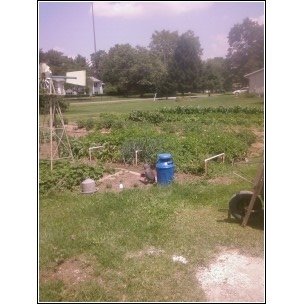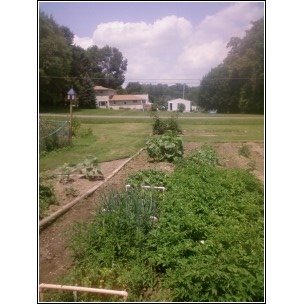In the last post, I talked about how much meat the US raises, consumes, and wastes in the average year. Today I'm going to touch on that a little more, and bring up the many reasons why we will no longer eat grocery store meat. Actually, make that *can't* eat grocery store meat.
First of all, we have to face the facts that society is always changing. In a previous post, I talked about how much things changed as people moved off the family farms and homesteads, and into the larger towns and cities. As these areas expanded and grew, people became more dependent on the store and the butcher. While a large population still provided for themselves, many people could no longer do so, or just plain didn't want to. They worked a job for a wage, and that wage provided them with the things they wanted and needed. The demand for food grew as these people settled more and more for city life. In a sense around this time, farms grew from providing for their own family and small communities, into businesses that could provide for more consumers.
Just going back 80 years to the 1930's, 24% of the American population worked in agriculture. In 2002, that number dropped to 1.5%. In 1940, each farm worker was able to roughly provide for 11 consumers, yet in 2002, that one worker was able to provide for 90. Data I have found has shown that agricultural production had doubled four times between 1820 and 1975, while the number of actual farms has fallen 63%. since 1900. So, basically, less farms today produce more food. Farm operations have become specialized, from an average of five commodities per farm in 1900 to one per farm in 2000. While the number of farms and farm workers has dramatically dropped over the years, the US population has exploded by roughly 205 million people in the 20th century. The population was around 76 million in 1900, and was close to 281 million in the year 2000. These "factory farms" were nearly a necessity, simply because of demand.
As the demand grew for food production, the landscape changed dramatically. Since 1860, approximately 260 million acres of forests have been cleared out for meat production in the United States. Simple ranches have turned into factory farm operations, growing larger each year. As of 2009, 74% of the worlds poultry, 43% of the worlds beef, and 68% of the worlds eggs are grown in these factory type operations.In whole, 56% of US farms are devoted to beef production alone. With the growth of the factory farms, agriculture for crops had to grow along with it. In the US, 80% of the corn and 95% of the oats grown here are consumed by livestock. I looked for a nationwide average on water usage by factory farms, but couldn't find anything. I did, however, find that on average, it takes 2500 gallons of water to produce one pound of meat. A 600 pound steer will drink between 3.5 and 13 gallons per day, depending on weather and temperature. I've also found that the amount of water used to produce ten pounds of steak is just over the average water usage of an American household. Once again, I don't even want to do the math and get a rough estimate on how much water is used annually in the beef industry. I won't even go into how much of these crops are GMO's, that was another post.
I totally understand that there is a need for more food production as the population grows. That is not my issue. My problems are in the way these farms operate. Animals are generally kept in cramped quarters, given feed that is not natural to their diets, pumped full of antibiotics and steroids, deprived of sunlight,rarely (if ever) see open pastures, and not to even mention that the feeds are most likely GMO. Don't get me wrong, I'm no tree hugger or PETA type. I eat meat. Hell, I even raise and butcher my own chickens and rabbits. But I believe that not only I should be able to eat something free of chemicals, but I also believe that any animal, whether it's grown for food or not, deserves a good quality of life. That just doesn't happen on these farms.
Before I even go into spewing statistics and information on commercial farms and feed lots, I want to take a look at how much beef we actually consume as a nation. Americans on average, eat 67 pounds of beef per year. Numbers vary by location and even race, but those figures aren't important in keeping this where I want to go with this post. The fast food industry alone uses an enormous amount of the beef produced. In 1996, McDonalds beef usage alone was over 644 million pounds. Just like some of the numbers I found when I was writing the last post, this number to me is just staggering. Just out of curiosity, I looked up the US population of 1996. 265,189,754 million people, which I divided into that 64 million pounds. That works out to 2.43 pounds, per person in the US, in 1996. Just using McDonalds as an example. I honestly think I am going to be sick.
Roughly 13 suppliers in the US supply beef for the entire nation. Their numbers have decreased, but the number of cattle per feed lot has risen approximately 20%. Some of these feedlots can contain up to 100 thousand heads of cattle. I'm not going to do research on amounts and figures, but keep in mind that these cattle are fed mainly corn and soybeans (or products of them) so they fatten faster than they would grazing as they are designed by nature to do. Because of cramped, unsanitary conditions, the cattle are given antibiotics, whether they are sick or not, just as a "preventative" measure. I've found that nearly 30 million pounds of antibiotics are used annually on livestock in the US.
Cattle, the same as any animal eats, and creates waste. It's estimated that beef cattle alone in US operations produce 25 pounds per day per cattle, 250 thousand pounds per second nationwide, and over one billion tons annually. Waste from these farms can, and has, leaked into the waterways, eventually leading to the ocean. Though not from cattle, a six acre lagoon holding hog waste in North Carolina in 1995' spilling an estimated 25 million gallons spilled into the New river. Figures show that approximately ten to fourteen million fish died as the result. This problem is far more than just your normal waste. With the practices of these farms, the waste can contain growth hormones and/or antibiotics. There are studies that link dead zones in the ocean to this runoff.
The affects of the antibiotics and steroids on humans is a big debate. There are no studies that show 100 percent, without a doubt, that these are causing health problems. There are studies that show the possibilities that these are linked to cancers, birth defects, and many other health issues. My look at it is simple. I don't care what any study shows. Steroids and antibiotics do not belong on my plate.
I really have to stop here. I've spent enough of my time researching this stuff. Honestly, I don't want to read any more. I get more disturbed and disgusted with everything I read.
So what can we do about this? There is no one answer. What I can say, is to avoid grocery store meat as much as possible. Buy from local farmers who raise there beef with organic methods. Ask your local butcher where their beef comes from, and if their suppliers are organic. Stop eating fast food and supporting the need for these places. (that stuff is horrible for you anyway) Consider eating meatless meals more often. We generally eat 3-4 meatless dinners a week, and it hasn't been a problem. I though I would hate it, but I've grown used to it and like it now. Though I'm not a vegetarian, and have no plans to be, I do know that we don't "need" meat. There are plenty of other ways to get protein in your diet.
Think about all of this the next time you go shopping or make dinner.Any time you buy their product, you're adding to the machine. Make some changes. Make a difference. No one person can change or stop all of this, but many of us together can at least put a hurt on them. Personally, I sleep better at night knowing that my dollars aren't supporting these practices. How do you sleep?
Subscribe to:
Post Comments (Atom)
Blog Archive
-
►
2019
(1)
- ► Apr 7 - Apr 14 (1)
-
►
2016
(1)
- ► Jan 31 - Feb 7 (1)
-
►
2013
(1)
- ► Sep 1 - Sep 8 (1)
-
►
2012
(3)
- ► Jun 10 - Jun 17 (1)
- ► Jun 3 - Jun 10 (2)
-
▼
2011
(17)
- ► Nov 27 - Dec 4 (1)
- ► Nov 20 - Nov 27 (1)
- ► Nov 13 - Nov 20 (1)
- ► Oct 2 - Oct 9 (1)
- ► Jul 24 - Jul 31 (1)
- ► Jun 12 - Jun 19 (1)
- ► Mar 27 - Apr 3 (1)
- ► Mar 20 - Mar 27 (2)
- ► Mar 13 - Mar 20 (3)
- ► Feb 27 - Mar 6 (3)
-
►
2010
(51)
- ► Dec 5 - Dec 12 (1)
- ► Nov 7 - Nov 14 (3)
- ► Aug 29 - Sep 5 (1)
- ► Aug 15 - Aug 22 (1)
- ► Aug 1 - Aug 8 (1)
- ► Jul 25 - Aug 1 (1)
- ► Jul 18 - Jul 25 (1)
- ► Jul 11 - Jul 18 (1)
- ► Jun 27 - Jul 4 (1)
- ► Jun 20 - Jun 27 (2)
- ► Jun 13 - Jun 20 (2)
- ► Jun 6 - Jun 13 (3)
- ► May 30 - Jun 6 (1)
- ► May 23 - May 30 (2)
- ► May 16 - May 23 (1)
- ► May 9 - May 16 (1)
- ► May 2 - May 9 (2)
- ► Apr 11 - Apr 18 (2)
- ► Apr 4 - Apr 11 (3)
- ► Mar 28 - Apr 4 (2)
- ► Mar 21 - Mar 28 (1)
- ► Mar 14 - Mar 21 (3)
- ► Mar 7 - Mar 14 (2)
- ► Feb 28 - Mar 7 (2)
- ► Feb 21 - Feb 28 (1)
- ► Feb 14 - Feb 21 (1)
- ► Feb 7 - Feb 14 (1)
- ► Jan 31 - Feb 7 (1)
- ► Jan 24 - Jan 31 (1)
- ► Jan 17 - Jan 24 (1)
- ► Jan 10 - Jan 17 (3)
- ► Jan 3 - Jan 10 (2)
-
►
2009
(100)
- ► Dec 27 - Jan 3 (2)
- ► Dec 20 - Dec 27 (1)
- ► Dec 13 - Dec 20 (1)
- ► Dec 6 - Dec 13 (1)
- ► Nov 29 - Dec 6 (1)
- ► Nov 22 - Nov 29 (2)
- ► Nov 15 - Nov 22 (1)
- ► Nov 8 - Nov 15 (2)
- ► Nov 1 - Nov 8 (1)
- ► Oct 18 - Oct 25 (1)
- ► Oct 11 - Oct 18 (1)
- ► Oct 4 - Oct 11 (1)
- ► Sep 20 - Sep 27 (1)
- ► Sep 13 - Sep 20 (4)
- ► Aug 30 - Sep 6 (2)
- ► Aug 23 - Aug 30 (2)
- ► Aug 16 - Aug 23 (2)
- ► Aug 9 - Aug 16 (2)
- ► Aug 2 - Aug 9 (2)
- ► Jul 26 - Aug 2 (2)
- ► Jul 19 - Jul 26 (4)
- ► Jul 12 - Jul 19 (2)
- ► Jul 5 - Jul 12 (2)
- ► Jun 28 - Jul 5 (2)
- ► Jun 21 - Jun 28 (1)
- ► Jun 14 - Jun 21 (2)
- ► Jun 7 - Jun 14 (1)
- ► May 24 - May 31 (2)
- ► May 17 - May 24 (2)
- ► May 10 - May 17 (2)
- ► May 3 - May 10 (1)
- ► Apr 26 - May 3 (2)
- ► Apr 19 - Apr 26 (2)
- ► Apr 12 - Apr 19 (4)
- ► Apr 5 - Apr 12 (2)
- ► Mar 29 - Apr 5 (1)
- ► Mar 22 - Mar 29 (2)
- ► Mar 15 - Mar 22 (4)
- ► Mar 8 - Mar 15 (4)
- ► Mar 1 - Mar 8 (2)
- ► Feb 22 - Mar 1 (2)
- ► Feb 15 - Feb 22 (4)
- ► Feb 8 - Feb 15 (4)
- ► Feb 1 - Feb 8 (4)
- ► Jan 18 - Jan 25 (5)
- ► Jan 11 - Jan 18 (3)
- ► Jan 4 - Jan 11 (2)
-
►
2008
(63)
- ► Dec 28 - Jan 4 (3)
- ► Dec 21 - Dec 28 (1)
- ► Dec 14 - Dec 21 (3)
- ► Nov 30 - Dec 7 (2)
- ► Nov 23 - Nov 30 (2)
- ► Nov 16 - Nov 23 (1)
- ► Nov 9 - Nov 16 (2)
- ► Oct 26 - Nov 2 (2)
- ► Oct 19 - Oct 26 (3)
- ► Oct 12 - Oct 19 (3)
- ► Oct 5 - Oct 12 (5)
- ► Sep 28 - Oct 5 (1)
- ► Sep 21 - Sep 28 (1)
- ► Sep 14 - Sep 21 (1)
- ► Sep 7 - Sep 14 (33)










3 comments:
Thank you for sharing this. I am going to start the two to three meatless dinners a week. Maybe that will help a little bit anyway. Blessings jane
I recently discovered your blog and thoroughly enjoy it. My husband and I live on 2 acres and are currently in the process of converting the back acre to a garden/orchard. Any suggestions? We loathe the whole "beautiful green grass" mentality most people have concerning their yards! :)
Angela
The work you have done in these two posts are amazing and has so much good information. You are helping many people with this info. It will make us more aware of the food we are eating. Make us want to find a local farmer/rancher who sells and butchers their own beef. Can't beat the taste of home grown beef minus all the chemicals and medicines. Regardless of what some people think or say Chris, your post are great, helpful, and researched. Great Job...debbie
Post a Comment